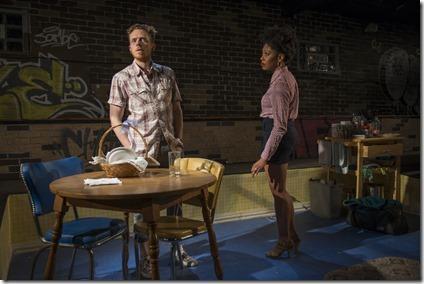
World premiere suffers from inauthentic interactions

Here's the short take on 's Sender . I didn't get it. Also: I don't believe there was anything substantive to actually get.
Unlike Holter's insightful and bitingly humorous earlier works (, ), Sender lacks believable characters or a story that holds you for its 90-minute run time. The premise is intriguing and director Shade Murray's cast is mighty. But that premise never plays out its potential and the four-person ensemble lacks a script worthy of its talents. is also hampered by a prolonged moment of gratuitous nudity. Despite the undeniable eye-candy, the scene is so startling (and unnecessary) it stops the story cold and derails what minimal momentum the 90-minute, intermission-less piece had going for it.

At lights up, Lynx has returned from the dead - or wherever he's been. Under appropriately ghostly lighting, he appears at Tess's doorstep. When her long, wordless gasps are over, Lynx strolls in, drops his duffel and hits the shower.
The second problem with Sender is that nobody ever makes Lynx take responsibility for his actions.We don't find out what prompted his disappearance. It's the elephant in the room that is barely discussed. Granted the impulse to disappear and start anew is one most people understand. Sooner or later, almost everybody toys with the tantalizing idea of shedding their life in favor of a brand new blank slate. "Mad Men" lasted the better part of a decade founded on that premise. But very few real-life people actually follow through on the temptation to vanish and wholly reinvent, not in the least because of the incontrovertible truth that no matter where you go, there you are.
Lynx, it would seem, is the rare exception. He leaves his bike by the side of the lake and leaves his friends to conclude that he's underwater. But there's little in Lynx's words or his bearing that hint at the heart of someone who could take this drastic step. Nor is there any indication as to why he came back. The great mystery of Sender is left unexplored.
Rather than demanding answers, Jordan and Tess react to Lynx's return by jumping into bed with him. In Tess's case, this is understandable, albeit a bit of a stretch. She was, after all, in love with Lynx. Jordan, on the other hand, spends the first half of the play being wholly, believably in love with his pregnant wife Cass and doting on their unborn baby. His abrupt, 180-degree emotional shift comes out of left field. Jordan goes from devoted husband to almost sociopathically stone-hearted abuser faster than you can say "Sybil." Since we're given no reason to believe that Jordan suffers from a multiple personality disorder, the switch is about as likely as a leopard changing his spots.



And that encapsulates the overarching problem with Sender . Nobody on stage acts in a way that feels true. Lynx's disappearance and reappearance, Jordan's sudden personality transplant, Tess's willingness to take up with Lynx despite what he's put her through - nothing feels authentic or even likely. The only time Holter comes anywhere near delving Lynx's motivations plays out in a drunken fantasy where the erstwhile gone boy starts raving about a pastoral wonderland in Wisconsin. It's the kind of wildly inebriated conversation you barely remember in the morning, a fantasy that only seems remotely plausible if you're blowing a 1.5 or higher.
Sender is decidedly not the work of a hack. Holter's got a keen ear for dialogue, and a killer sense of humor. When Tess exclaims "You're supposed to be dead," Lynx's mumbled response is along the lines of, "I don't really believe in labels, so..." Tess's apartment, we're evocatively informed, smells of whiskey and cats and cigarettes - in other words, "sadness." And you can't help but laugh at the mixology lesson that results in "Streetwise Robotussin".
Still and all, Murray's cast is better than the story their mired in deserves. Haggard is one of those chameleonic, compulsively watchable actors who fascinates, even when the material he's working with does not. Johnson is similarly fine, even if costume designer Alexia Rutherford has him looking incongruously Amish for the first half of the production. Williamson's Tess is all spit and vinegar and she nails the mix of rage and sorrow that surely results from mourning the loss of loved one, only to have that loved one show up a year later saying in effect, 'just kidding.' Chinn's Cassandra is problematic. Murray has her delivering everything in an odd, rapid-fire monotone, that starts to sound like a verbal tic after the first few sentence.s The monotone is an odd choice, especially given the character's clearly intense emotional life.
In the end, a competent cast and Holter's demonstrably superior writing skills can't save a play that never explores the issues it presents. There's a fascinating play to be made from the premise of a supposedly dead man coming back to life. This isn't it.
continues through May 29th at A Red Orchid Theatre, 1531 N. Wells (map), with performances Thursdays-Saturdays at 8pm, Sundays 3pm. Tickets are $30-$35, and are available by phone (312-943-8722) or online through OvationTix.com (check for half-price tickets at Goldstar.com ). More information at ARedOrchidTheatre.org. (Running time: 90 minutes, no intermission. Note: contains nudity, adult language and mature themes.)

Steve Haggard (Lynx), Mary Williamson (Tess), McKenzie Chinn (Cassandra), Steven Wilson (Jordan), Laura Tatar, Joseff Stevenson (understudies)
behind the scenes
Shade Murray (director), (set, lighting design), Alexia Rutherford (costume design), (sound design), Bronte DeShong (properties design), Josh Altman (dramaturgy), Kirsten Fitzgerald (fight director), John Wilson (technical direction), Mierka Girten (casting), S. G. Heller (stage manager), Jamie Crothers (production manager, assistant stage manager), Eva Gemio (assistant director), Anthony Venturini (set painter), Michael Brosilow (photos)
Tags: 16-0438, A Red Orchid Theatre, Alexia Rutherford, Anthony Venturini, Brontë DeShong, Catey Sullivan, Chicago Theater, Eva Gemio, Ike Holter, Jamie Crothers, Joe Fosco, John Wilson, Joseff Stevenson, Josh Altman, Kirsten Fitzgerald, Laura Tatar, Mary Williamson, McKenzie Chinn, Michael Brosilow, Mierka Girten, Mike Durst, post, S.G. Heller, Shade Murray, Steve Haggard, Steven Wilson
Category: 2016 Reviews, A Red Orchid, Catey Sullivan, New Work, World Premier

